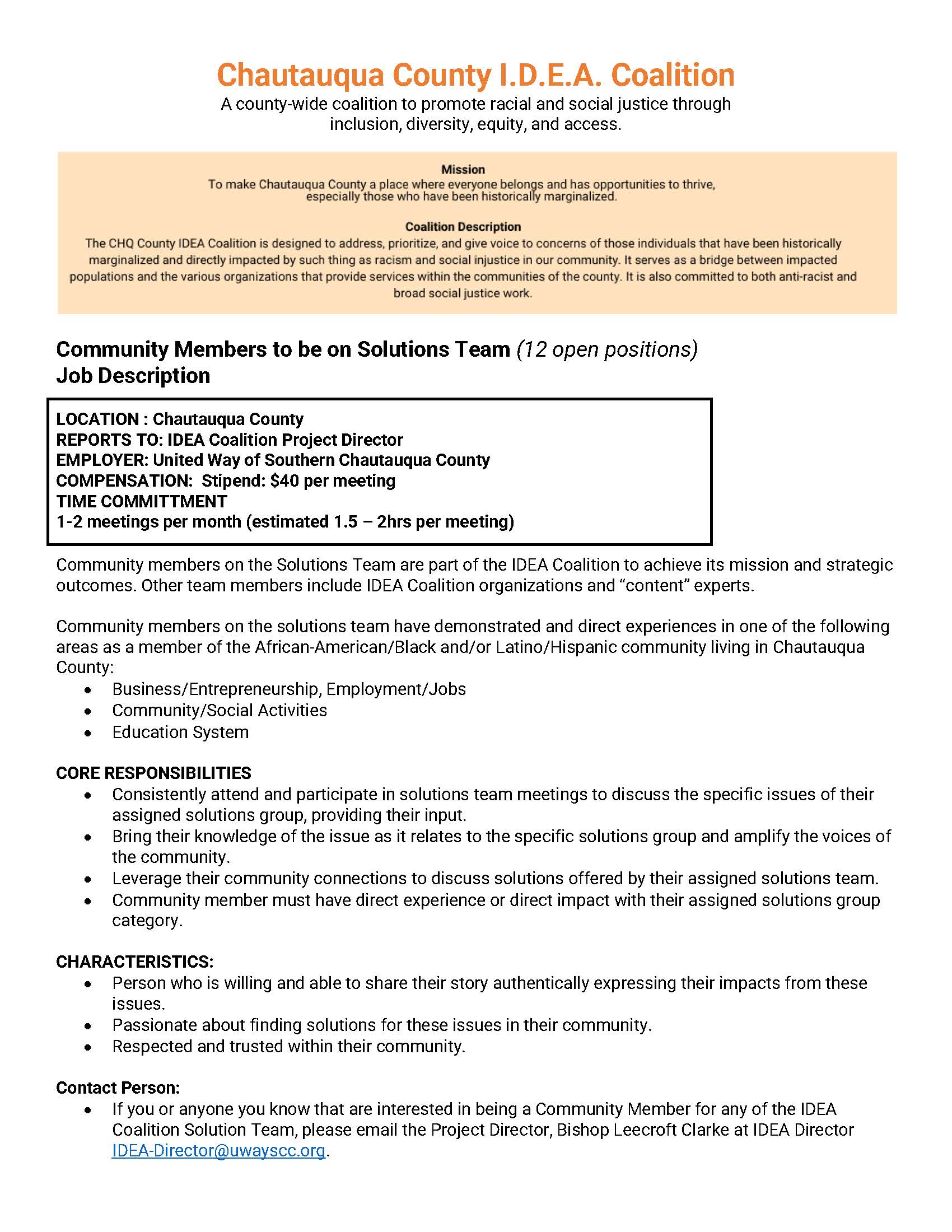Click here to visit the new website home of The Chautauqua County I.D.E.A. Coalition
Click here to read more about this transition.
Mission:
To make Chautauqua County a place where everyone belongs and has opportunities to thrive, especially those who have been historically marginalized.
Coalition Description:
The Chautauqua County I.D.E.A. Coalition is designed to address, prioritize, and give voice to concerns of those individuals that have been historically marginalized and directly impacted by such things as racism and social injustice in our community. It serves as a bridge between impacted populations and the various organizations that provide services within Chautauqua County. It is also committed to both anti-racist and broad social justice work.
Goals:
- Engage historically marginalized populations and identify barriers and concerns related to belonging and thriving.
- Prioritize issues/themes that emerge from those direct conversations.
- Create space for collaboration and collective work across organizations and those directly impacted to help address identified barriers and concerns.
Strategic Outcomes:
- Community organizations and agencies equipped to better serve all residents.
- Community members engaged to ensure accountability.
- Community-based initiatives designed and implemented to sustain desired outcomes.
- Businesses and Corporations engaged to contribute to positive social impact.
FOLLOW US ON FACEBOOK!
Click HERE!
Audubon Community Nature Center
The Chautauqua County Chamber of Commerce
Chautauqua County Department of Planning and Development
Chautauqua County Office for the Aging
Chautauqua Region Community Foundation
Chautauqua Region Economic Development Corporation
Child Advocacy Program of Chautauqua County
Church Apostolic House of Prayer
Davey Resource Group
Dream It, Do It of Western New York
Erie 2 Chautauqua Cattaraugus BOCES
Family Service of Chautauqua Region
#IntegrityFirst, Inc. Jamestown Jackals
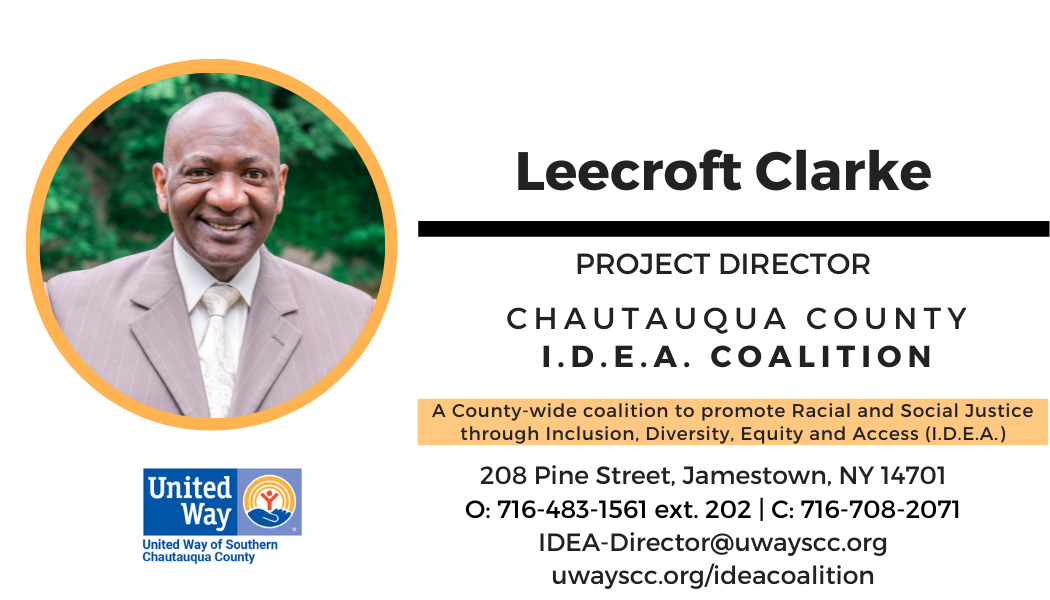
Originally from Jamaica, Leecroft Clarke moved to Jamestown 22 years ago to work for SKF as a Business Development Manager; he also worked for TitanX Engine Cooling for almost ten years. In addition, he worked in various engineering and project lead positions for The Torrington Company (located in Connecticut) for more than 12 years. Clarke has a Bachelor of Engineering, a Master of Business Administration, and a Doctor of Ministry degree. He is currently the lead pastor of Healing Word Ministries Church of God. His extensive community service includes his roles as the chairperson of the Addiction Response Ministry of Chautauqua County, board member for the HOPE Chautauqua Coalition, co-chairperson of the Racial Reconciliation Taskforce of Chautauqua County and a member of the ESPRI Taskforce. Organizations interested in becoming a member can contact I.D.E.A. Director Leecroft Clarke at IDEA-Director@uwayscc.org.
I.D.E.A. Community Engagement Liaisons
Patricia Graves – South County
- janel.graves@gmail.com
- c: 917-548-7518
Vidalys Holmes – South County
- vidalyscolon@yahoo.com
- c: 716-499-2048
Sandra Lewis – North County
- sandra.lewis@fredonia.edu
- c: 716-672-9436
Shiloh Rivera Martinez – North County
- 9knivesgraphix@gmail.com
- c: 718-200-3071
I.D.E.A. Resources
- IDEA Business Case
- National Equity Atlas
- Organizational Racial Equity Self-Assessment Survey
- YWCA DEI Trainings
Three Priority Areas For The Coalition's Work:
The following documents are narratives that capture significant problems in our community, as defined by directly impacted community members themselves.
These three barriers emerged as priorities during a series of town hall meetings and surveys held in the winter and spring of 2023.
The next steps will be to develop solution teams to address these challenges. This report highlights one of the three barriers identified by the community.
PRIORITY AREA: COMMUNITY/SOCIAL ACTIVITIES
Click HERE or click the picture for the narrative below!
PRIORITY AREA: BUSINESS/JOBS/EMPLOYMENT
Click HERE or click the picture for the narrative below!
PRIORITY AREA: EDUCATION SYSTEM
Click HERE or click the picture for the narrative below!
I.D.E.A. Coalition Announced at Jamestown and Dunkirk Juneteenth Celebrations
October 2022 I.D.E.A. Newsletter
January 2023 I.D.E.A. Newsletter
I.D.E.A. Coalition Announces Initial Public Engagements, Community Engagement Liaisons, New Members
Over 70 Attend Meeting for Black-African American Community to Discuss Concerns
IDEA COALITION BACKBONE AGENCY TRANSITION
Since 2021 United Way of Southern Chautauqua County has been the backbone agency for IDEA Coalition. In February 2024, the administrative oversight will transition to the YWCA of Jamestown. Below are Talking Points for the rationale and background for this transition.
1.What role has the United Way played as a backbone agency for the IDEA coalition? What have been the accomplishments of this coalition so far?
- UWSCC was the original convener of the organizations and companies that eventually formed the IDEA Coalition, using a collective impact model (a collaborative approach to addressing complex social issues). The backbone agency work includes administration of the coalition (hiring and paying project director and community engagement liaisons; documentation of all files and activities; primary communication and coordination for coalition meetings and public facing communication like website and social media; tracking metrics and data).
- Coalition accomplishments include growing the coalition from 18 original members to its current 45; obtaining almost $100,000 in grants to support the work; 6 townhall meetings/listening sessions county-wide; creating a structure and leadership for the Coalition’s work; coordinating several DEI trainings. A full description of the Coalition’s work since its inception under the leadership of UWSCC may be found by reading the following Progress Report found HERE.
2. Why is the backbone agency switching from UWSCC to YWCA?
- Long-term sustainability of this needed work in our community means it should be embedded in an organization for whom anti-racism work is a critical component of their mission. Long-term sustainability also requires that we leverage financial and human resources that already exist in the community.
- YWCA’s existing social justice and racial equity program means they have staff already focused on equity work at a leadership level.
- The mission of YWCA is eliminating racism, empowering women and promoting peace, justice, freedom, and dignity for all. By virtue of its mission and programs, YWCA is more connected to directly impacted communities and those who have been historically marginalized. Our priority on centering the feedback of those communities means they are an organization better positioned to carry forward this value into the solution phase.
- UWSCC’s central role is to incubate critical community impact initiatives, including building a framework for change, providing initial resources and convening key stakeholders to the table. We will continue to provide leadership on the coordinating committee, as well as participation and support at the highest levels. We will also continue our capacity in convening key stakeholders to this work and mobilizing funding to support it.
3. Why now? What is the timeline of this change?
- We are moving into the solutions phase of the IDEA Coalition’s work, and it is a natural transition point from problem-focused/structure-building to solution-focused/implementation.
- The plan is for the transition to happen by February 15, 2024. Our goal is to spend the next 3 months connecting with community members and coalition members so we can both finalize solution teams, inform them of the change in leadership, and provide them with training that will ground solution implementation. We will also intentionally build a leadership transition with a “warm hand-off" between project directors. The new project directors are currently actively involved with major leadership decisions, co-working with Bishop Clarke.
4. Will there be a change in leadership for this project? Who are the new leaders?
- a. Project Directors will change, but their primary objective and responsibility remains the same: to continue to steward the collective work of the coalition and the feedback we heard during the townhall meetings as well as direct toward solutions.
- New project directors – Alize Scott-Nowell and Indo Quinones – are well equipped to do this with extensive experience and education in these areas and have been in their leadership roles at the YWCA for quite some time. See link for full bios: https://www.ywcajamestown.com/sjstaff
- Bishop Clarke’s will continue to be available as needed and requested by IDEA Coalition leaders, but no longer in a director role. His service to the coalition has been tremendous and his leadership style and skillset were ideal in the first phase of the Coalition’s work. The new project directors’ styles and skillsets will be a strength in this solution phase of the Coalition. Bishop Clarke has been strongly committed to racial reconciliation work over his entire career and service in Jamestown and will continue to be involved as a community member and leader at his church and in the Black / African American community.
5. What is the mission of YWCA? What has the YWCA done recently in its anti-racism commitment?
- YWCA Jamestown is dedicated to eliminating racism, empowering women and promoting peace, justice, freedom, and dignity for all. Recent examples:
-
CHQ County Book Read
-
Book MARK program- Reading program for youth on understanding inclusion and acceptance of others.
-
Doing work within the organization to promote IDEA internally
-
Creation of Social Justice and Race Equity Director (2021) and Mission and Impact Director position (2022)
-
YWCA Jamestown has offered training on equity and inclusion to school districts and non-profits in Chautauqua County and beyond.
-
Until Justice Just Is Summit- Held for the first time in April of 2023. The summit included information on building a diverse workforce and the intentionality and investment needed to become an equitable and inclusive community.
6. Does YWCA have a presence in northern CHQ County? How will we ensure that north county residents will continue to have their concerns addressed?
- For over 10 years, YWCA Jamestown has provided services in Northern Chautauqua County. Programs include Girls Circle in partnership with Boys and Girls Club of NCC, and Dunkirk. Additional programs are the Community Health Awareness Team (CHAT/CAPP) health education classes provided in Brocton, Westfield, Fredonia and Dunkirk. CHQ Book read has had reading options in Westfield, Chautauqua and Dunkirk.
- As many are already aware, YWCA does not have a physical location in Dunkirk; however, our programs do serve the entire county.
- The IDEA Coalition remains 100% committed to serving the entire county and is aware that solutions and activities may differ in the North County.
7. Are the YMCA and YWCA the same organization?
- No, they are two different organizations. Both serve important community needs.
8. Will United Way SCC continue to have a role in the coalition?
- Yes. United Way will continue to be a member of the coalition, with staff and leadership participation on solution teams and coordinating committee. We will continue investing in resources and collaborating with the YWCA
9. What will be the impact on community members from this administrative change?
- Commitment to involving community voices is going to be our highest priority, so we don’t foresee many changes in that area.
- YWCA works more closely with directly impacted communities that are the focus of the IDEA coalition, so we see community members having additional opportunities for involvement in these efforts.
10. How will this administrative change impact the work of the coalition and its member organizations?
- The description of the Project Director will mostly stay the same. We don’t anticipate any major changes. Any changes that happen are going to reflect the new phase of our coalition’s work.
- Members should anticipate continuing to meet four times a year in-person.
11. How will this administrative change impact funding for this project?
- This change is going to increase the sustainability of the IDEA coalition because the YWCA has already created positions to do this work.
- This will enable both YWCA and United Way to work together to fund the coalition work, with anticipated grant support from local, regional and national foundations.
IDEA Coalition Process
The focus of the diagram depicted below is to highlight the structural flow process for the 12-Month Approach strategy currently used by the IDEA Coalition’s Implementation Team to determine, analyze, and identify solutions regarding the community concerns/barriers.
We are now embarking on the third step of the process to identify the solutions for the top three focus areas mentioned.
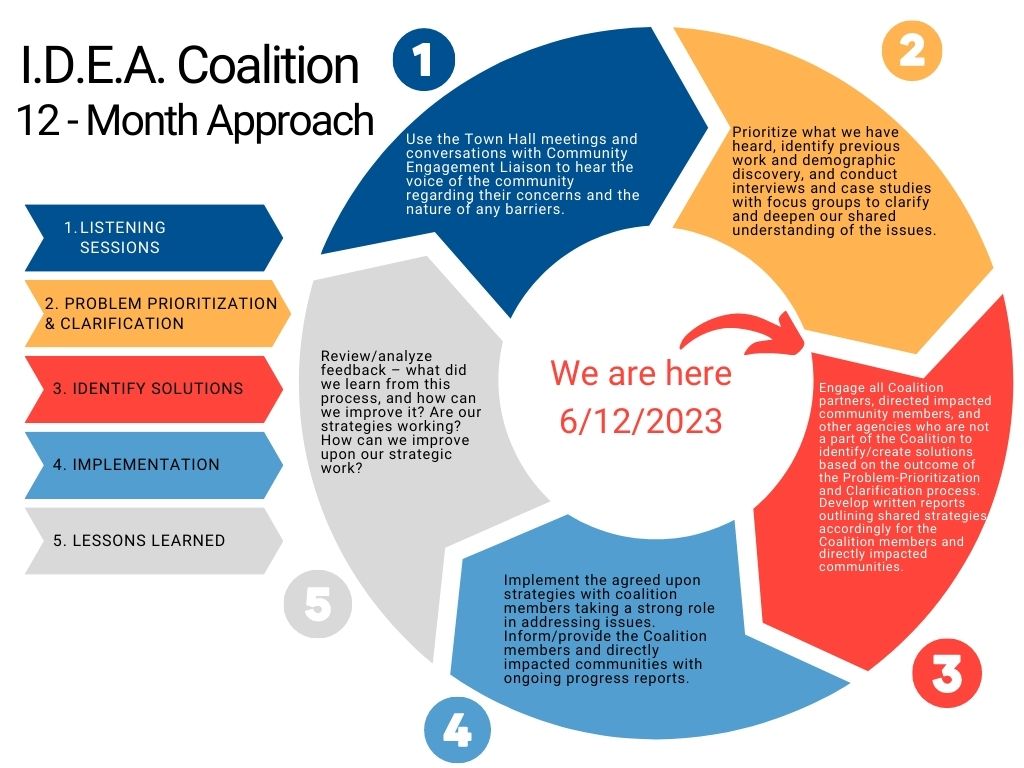
- Listening Sessions
Use the Town Hall meetings and conversations with Community Engagement Liaison to hear the voice of the community regarding their concerns and the nature of any barriers.
- Problem-Prioritization and Clarification
Prioritize what we have heard, identify previous work and demographic discovery, and conduct interviews and case studies with focus groups to clarify and deepen our shared understanding of the issues.
- Identify Solutions
Engage all Coalition partners, directed impacted community members, and other agencies not part of the Coalition to identify/create solutions based on the outcome of the Problem-Prioritization and Clarification process. Develop written reports outlining shared strategies relative to the Coalition members and directly impacted communities.
- Implementation
Implement the agreed-upon strategies with Coalition members taking a strong role in addressing the issues. Inform/provide the Coalition members and directly impacted communities with ongoing progress reports.
- Lessons Learned
Review/analyze feedback – what did we learn from this process, and how can we improve it? Are our strategies working? How can we improve our strategic work?
OPEN POSITIONS FOR SOLUTIONS TEAM COMMUNITY MEMBERS
Click HERE to download the job description in English:
Click HERE to download the job description in Spanish.


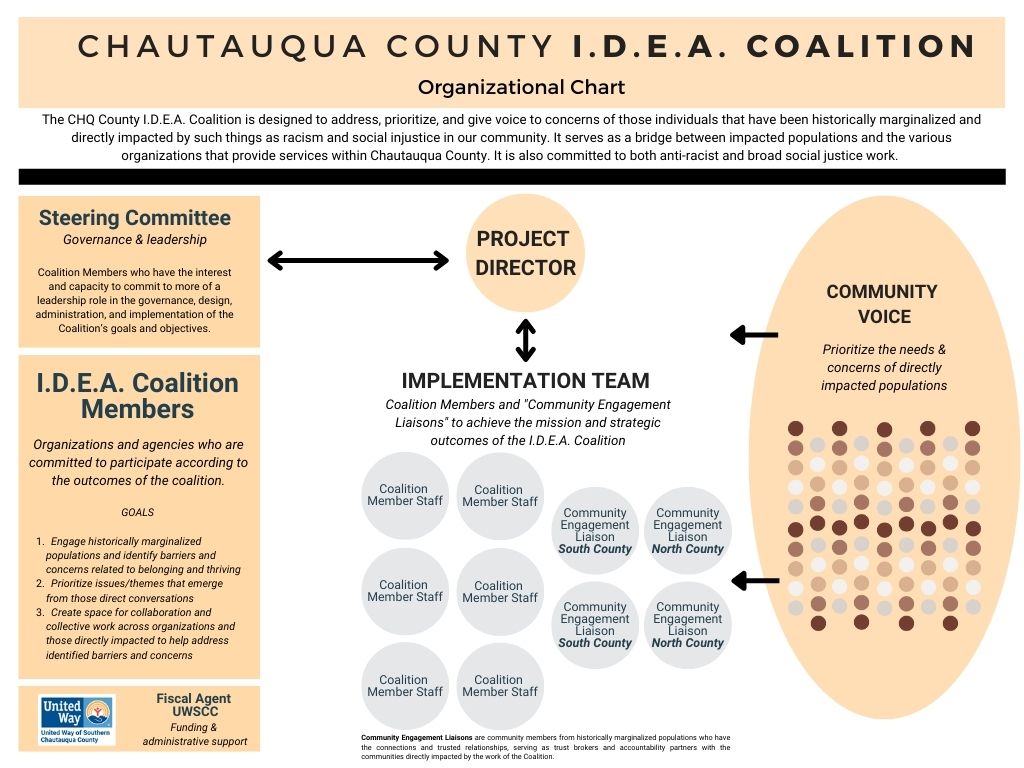
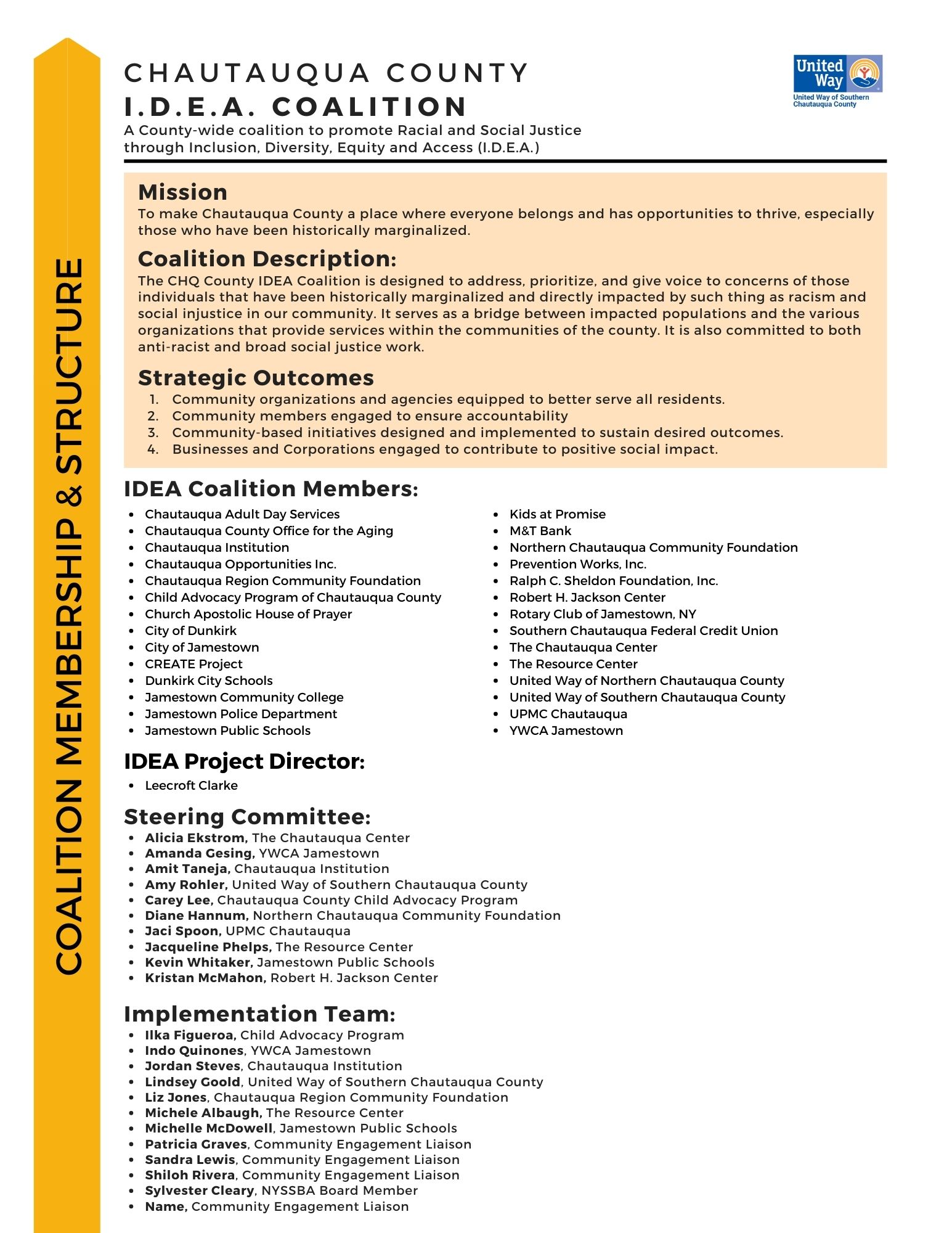
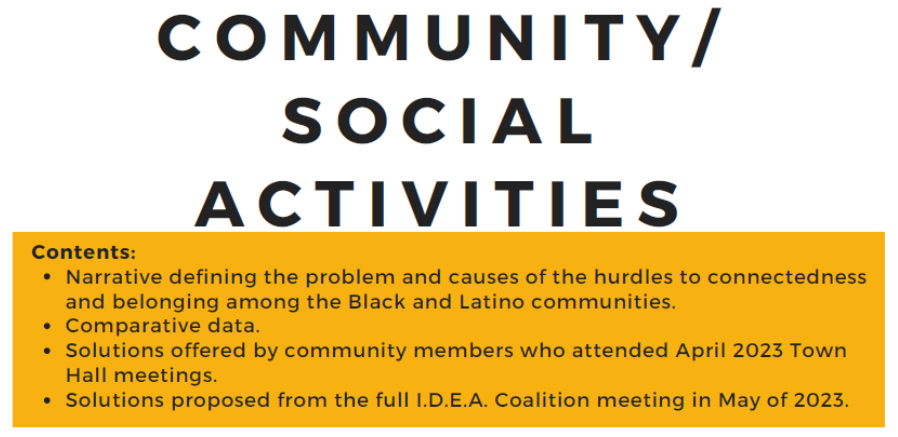
.png)
.png)
